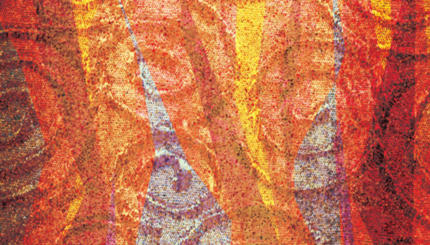Commentary on Parashat Nasso, Numbers 4:21-7:89
Parashat Nasso contains rules for the priests, for the clans of the tribe of Levi, for testing an unfaithful spouse, and for the Nazir, who is a person who has taken special vows of dedication to God. Then the heads of the tribes bring gifts for the dedication of the Mishkan (Tabernacle) and at the very end Moses hears the Voice of God in the Ohel Moed, or “Tent of Meeting” at the heart of the Mishkan.
In Focus
“God spoke to Moses, saying: Speak to Aaron and his sons, saying: ‘This is how you will bless the Israelites, saying to them:
May Adonai bless you and keep you; may Adonai cause the Face of the Divine to shine upon you; may Adonai lift the Face of the Divine to you, and give you peace.
Let them place My name upon the Israelites, and I will bless them. (Numbers 6:22-27)
Text
This is a very “religious” portion; the little narrative there is concerns gifts to the Mishkan, and all the other regulations in the parsha deal with ritual and religious matters. As part of the overall preparations to dedicate the Altar in the Mishkan, the priests are given a formula by which they will bless the people. This blessing is still very much part of Jewish liturgy today; it is recited in many traditional synagogue services, and often at weddings and bar/bat mitzvah celebrations as well.
Commentary
The ancient rabbis were very much aware that any kind of intermediaries between God and the people might be thought of as somehow divine beings in their own right. After all, the Torah itself tells us that the people wanted Moses to come between them and the Divine Presence (Exodus 20:15); apparently, not much later, they considered Moses to be a kind of demigod who leads them. (Cf. Exodus 32, the story of the Golden Calf.) Thus, the rabbis stress that it is God who brings blessing, not the priests themselves:
With your help, My Jewish Learning can provide endless opportunities for learning, connection and discovery.
Do not say, “this kohen (priest), who is incestuous and a murderer, is to bless us!?” For the Holy One, blessed be God, says: “Who blesses you? Am not I the one who blesses you, as it is written: “Let them place My name upon the Israelites, and I will bless them?'” (Jerusalem Talmud, Tractate Gittin, 47b)
What I find fascinating about this midrash is the suggestion that an incestuous or murderous priest could, in fact, offer these words of blessing! To be fair, I don’t know if that was the intent of the authors of this midrash, but I do think that it reminds us not to ascribe magical powers to ritual leaders. Ideally, they are only the vessel or the means by which something greater is accomplished. In fact, at many synagogues rabbis and cantors are called klei kodesh, or “holy vessels,” a term that stresses that Jewish religious leaders are merely a means to achieve larger goals.
Yet we might also ask: If God wished to bless the people with a direct, Divine blessing, why were priests given this special role at all? Certainly there would be no risk of theological confusion among the Israelites if the Holy One simply announced the blessing without anybody’s help!
Rashi says something that may be helpful here: saying to them…this is a full (spelling, indicating:) do not bless them in haste, nor in hurried excitement, but with full consciousness (kavannah), and with a whole heart.
Rashi believes that the priests were commanded to have the proper reverence as well as the proper wording. Perhaps then we can say that the priests were chosen not only as vessels of blessing, but also as role models of caring for the people. Maybe God didn’t need the priests to deliver a blessing, maybe God needed the kohanim (priests) to show the other Israelites what it meant to be reverent and loving, to wish the best for someone else, to pray for another with a “whole heart.”
In other words, God did not want these ritual leaders to have Divine powers, but rather, a full humanity — and maybe that’s why these words still move us today.
Provided by KOLEL–The Adult Centre for Liberal Jewish Learning, which is affiliated with Canada’s Reform movement.
Adonai
Pronounced: ah-doe-NYE, Origin: Hebrew, a name for God.
parsha
Pronounced: PAR-sha or par-SHAH, Origin: Hebrew, portion, usually referring to the weekly Torah portion.
Torah
Pronunced: TORE-uh, Origin: Hebrew, the Five Books of Moses.


